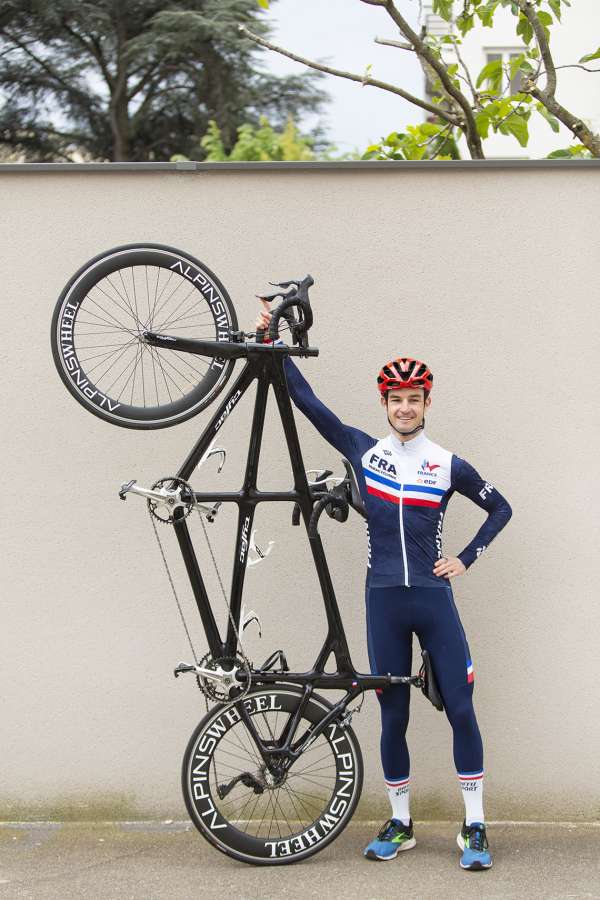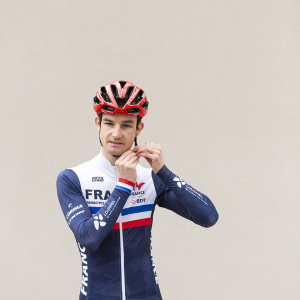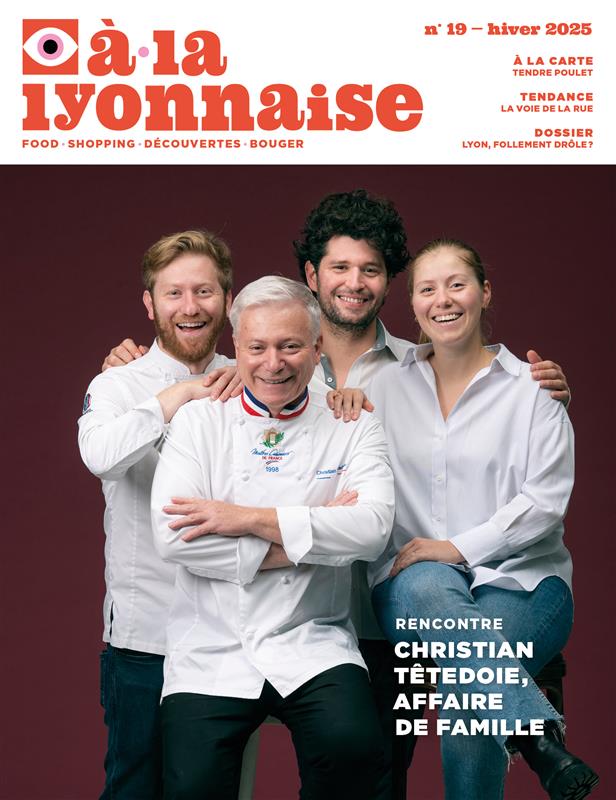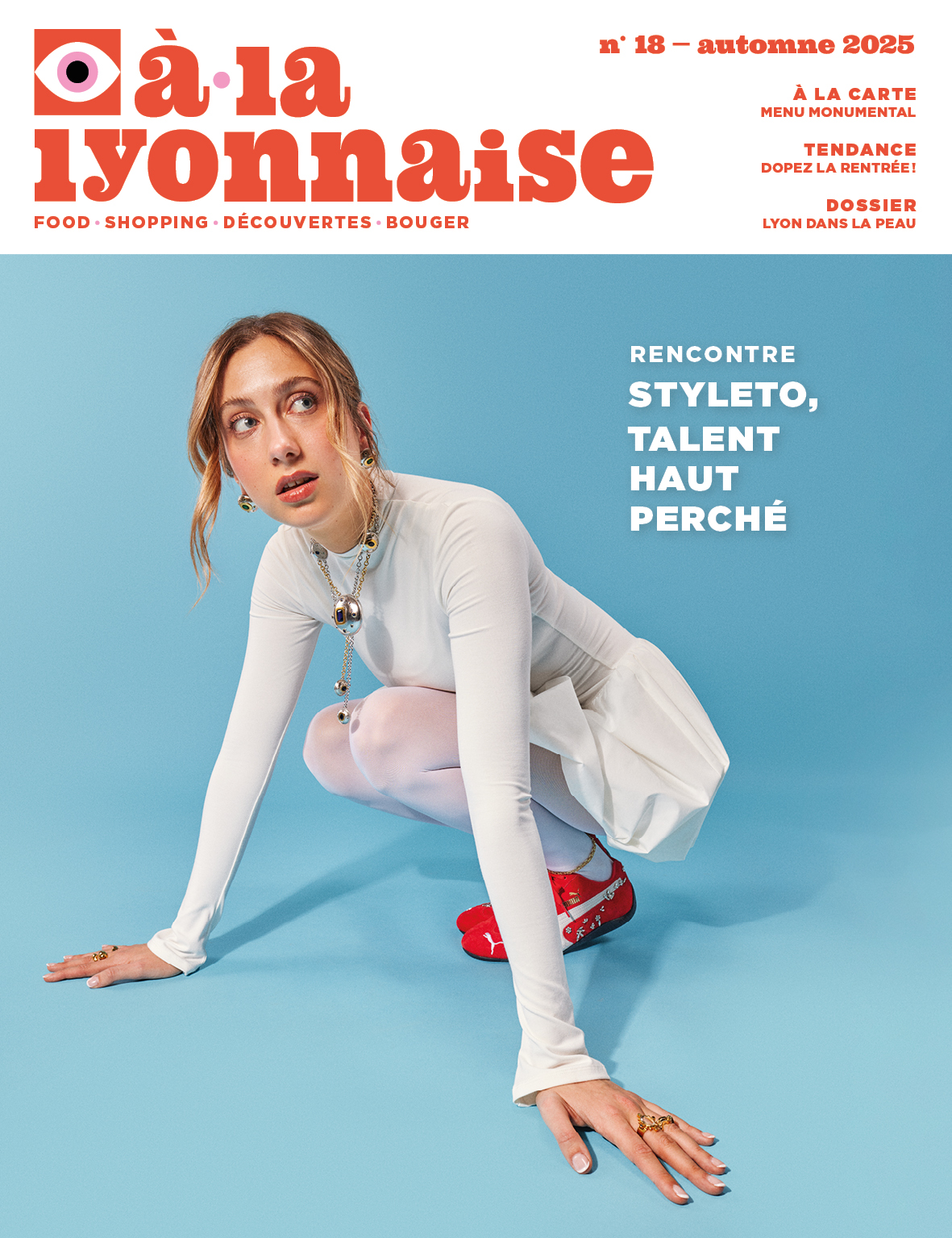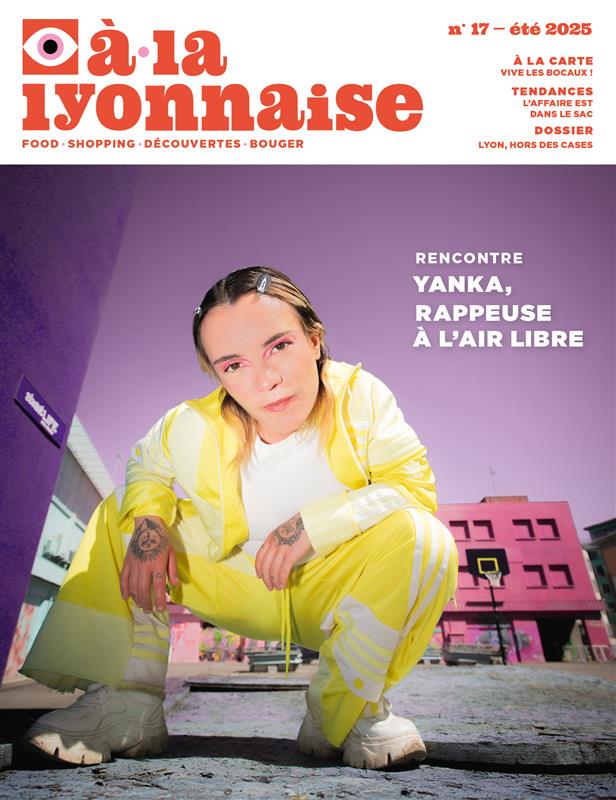Alexandre Lloveras, on the road to the Paralympic Games

Aged 24, para-cyclist Alexandre Lloveras is one of our best hopes for a medal at the 2024 Paralympic Games. Visually impaired from birth, a student in physiotherapy in Lyon, and a past Olympic Champion in 2021, Alexandre is today battling to earn a place on the olympic team, winning respect for his determination to overcome all obstacles. He was kind enough to share some of his free time with us in between training sessions.
By Audrey Grosclaude.
Our interview with Alexandre Lloveras.
You’re now a para-cyclist, but you began high-level sports in athletics. Could you tell us about that?
I started doing athletics at the age of 12. I was an 800-metre runner, but my real speciality was injuring myself (Editor’s note: laughs). When I arrived in Lyon to study sports, in the first year of high school, I made a lot of progress in the first six months, but I then picked up all sorts of injuries. It was very frustrating to see my
dream of taking part in the Games drift out of reach, as I knew there was work to do and I was running out of time.
Finally, you ended up doing cycling…
I’d always been an occasional cyclist with my Dad as we had a tandem at home, but the switch happened in the last year of high school. I was injured and I needed to do a preparation course with the athletics team. I thought I’d go and do some indoor cycling. My Mum thought that maybe we could find something better. She
found a para-cycling course happening at the same time. There, I cycled with Dorian Foulon (Editor’s note: triple world champion this year in Rio; gold medallist in
the individual pursuit C5 at Tokyo 2021), who had already achieved a very high level. I was instantly hooked by the sensation of speed going downhill and the feeling of freedom!
You cycle on a tandem with a pilot; how do you choose a team-mate?
The first rule is that the pilot isn’t allowed to be part of a professional team. They of course need to have the highest possible level, as it is a team sport. Compared with athletics, where the guide runs at the athlete’s speed, with cycling, it’s about two people combining their efforts; it’s a team sport in its own right. The pilots are selected by the federation. My team-mate for the Tokyo Games, Corentin Ermenaud, is trying to win a place in the non-disabled Olympic team. Right now, I’m cycling with Yohan Paillot. He performs better over the long run; I’m better in short bursts. We’re learning how to work together to get the best out of one another. Beyond performance, human aspects are very important in the pairing because we spend all our time together; so we need to get along with each other.
What is your typical day like?
We’re often training with the French team, at the velodrome in Roubaix. We train there twice a day: on the track in the morning; on the road in the afternoon. The training is pretty intensive. When I’m in Lyon, I cycle with pilots who I’ve met over the years, and through the Tandem Club Rhodanien, which has supported me since 2018. They’ve organised a challenge to encourage me: a hundred or so tandems will cycle for five days, from Lyon to Paris, for the opening ceremony.
« Tandem cycling is ateam sport in itsown right »
What are your favourite places to train in Lyon?
There are loads of options: we cycle to the north of the city when we want flat roads; otherwise, we go to the Monts d’Or, the Monts du Lyonnais, the Beaujolais, and sometimes the Pilat. For intensive or endurance training, I use my Home Trainer: a fixed bike with a moving platform for standing positions. I also use the virtual cycling app Zwift. This allows me to do specific training sessions designed by the French team’s trainer, Mathieu Jeanne*, without being bothered by traffic. What’s lacking is an indoor velodrome. The velodrome at Tête d’Or park is outdoors, and it’s not an Olympic track. There was talk of building one in Décines. It’s a shame that it didn’t come to anything.
* Alexandre also works on physical preparation at Club Victor Hugo, in Lyon’s 8th district, with Ludovic Perge and Maxence Praly, as well as mental preparation with Yannick Bertrand.
You often say that it’s almost harder to qualify for the Olympics than it is to win a medal in your sport, is that right?
There are so many high-level athletes in France that some may have a shot at winning an Olympic medal but don’t get selected. There is something particular to the Olympics, which is quotas. This is what makes it possible to have representativeness, to have so many countries compete. In France, there are twenty or so athletes and a dozen places up for grabs. The competition is positive; we push each other beyond our limits, but we know that not everyone will get on the team.
How do the qualifications work?
ll be classed on the 15th of July, not before then. There’s a set of classes: a gold medal at the 2024 world championships will get you into class 1; a medal at the 2023 world championships into class 2; being a multiple medal-winner in previous world championships into class 3… For now, I’m not in the top part of the list; it’s going to be tough, but I’m hopeful I’ll make it. I’m all the more confident because Yohan and I found some great ways to gain time during our last session in the wind tunnel.
Alongside this, you’re studying to be a physiotherapist; why this profession?
I chose it fairly early on. For my work experience in secondary school, what with all my injuries, I realised that it was a very good choice (Editor’s note: laughs). I like the idea of re-educating, helping a patient to move forward or avoid backsliding. It’s also a super varied profession because you can work in lots of areas, like sport, paediatrics, cancerology… At the moment, I’m not doing too many courses on sport, because I want to discover other fields, but there is a chance that I will specialise as a sports physio at the end of my studies in 2026 (Editor’s note: for high-level sportspeople, all years are split into two in order to allow time for their sports career).
In the meantime, how are you earning a living from your “job” as a para-cyclist?
I’m a member of L’Armée des Champions. I extended my membership until 2026. That means that I’m an employee of the French army. I’m not a soldier, but I do
have missions related to communication and representation. It’s a big help, as it allows us to train with peace of mind. There are also some private partners that
help us make a living from our sport and fund our seasons. Before, it was much more difficult, but there has been some change with the upcoming Paris Olympics.
« I love Lyon, we’re close to everything! »
And how does Lyon fit in with all this? What’s your relationship with the city?
I love it! For the food first and foremost! It’s not a very original thing to say, but it’s true, even though I have to be careful about having a varied diet. I can ndulge myself from time to time; it’s no big thing, because I burn the calories off fast with training. I also like my local area (Editor’s note: Lyon’s 8th district), because it’s peaceful and I’m not far from the campus. The thing I love about Lyon is the public transport. I don’t have a car, obviously, so I only travel by public transport; our city is convenient in that it has good transport links. In terms of accessibility, for example the metro, it’s night and day with Paris. Finally, I like to travel a lot, and the other good thing is that we’re close to everything: two hours from Paris; and not far from the Alps and the sea.
Outside of cycling, do you do any other sports, or play piano...
When I was younger, I went skiing and horse-riding, but if I really wanted to do another sport seriously it would be cross-country skiing. With piano, I started playing after the Tokyo Olympics, but it’s difficult unfortunately; we’re often travelling and each time I return to it I have to go back over the same things, which is frustrating.
Are you inspired by any other sportspeople?
LThe biathlete Martin Fourcade. He has a really impressive career. I saw him at the Théâtre des Célestins this year. There’s also Charles Leclerc, an F1 driver, for the
way he analyses his performance. He recognises his mistakes and it’s not easy to be so clear-sighted about yourself.
Biography
Born in Lyon in 2000, Alexandre Lloveras has had a visual impairment from birth. So has his brother Paul Lloveras, a disabled triathlete, who is also in the running for the Paris Paralympic Games, to be held from 28 August to 8 September.
After a sports and study course in the athletics division of Pôle France, first at Lycée Jean Perrin (Lyon 9th district), then
in Talence, near Bordeaux, Alexandre returned to Lyon to study physiotherapy at IFM KDV, a massage-physiotherapy
training institute for visually impaired learners (Lyon 8th district). He switched disciplines and became a para-cyclist in
2018. With a field of view equivalent to “a keyhole”, Alexandre competed in category B2, in tandem, accompanied by a sighted guide. Having won a medal at the 2021 Tokyo Olympics, he is now trying to make it on to the Olympic team to take part in three Olympic events: pursuit (on track, 7 km); road race (around 130 km); and time trial (28 km). Holder of the prestigious title ‘Chevalier de la Légion d’Honneur’ since 2021 and a member of L’Armée des Champions, he hopes to be able to continue his career until the 2028 Olympics in Los Angeles. We wish him all the best along the way.
You can follow him at: : @alexandre_lloveras
Alexandre's adress book
Grimpeurs Cyclist House“This is a café-restaurant with a mechanics area and a training area equipped with home trainers. There’s also a shop. Everything here is related to cycling.”
2 rue d'Oran, Lyon 1er Mont Thou
“There are loads of great places for cycling in Lyon, including Mont Thou. The view is amazing, but it is a hard climb for beginners, particularly the last two to three hundred metres.“ Gueuleton
“I discovered this place not long ago; it’s a great restaurant specialising in meat, near Foch.”
29 rue Molière, Lyon 6ème Sherrington Express
“When I have classes, I sometimes come here for lunch, to change from the uni canteen. There’s a restaurant to eat in and they do take-aways next door. The food is really good and balanced.”
14 promenade Léa-et-Napoléon-Bullukian, Lyon 8ème Cycle Bongiorno
“Fred’s place. Frédéric Annequin is without question one of the city’s top mechanics. I don’t come here often, but whenever I have a problem, I know that he has the solution.”
52 rue Joannès-Vallet, Vénissieux
